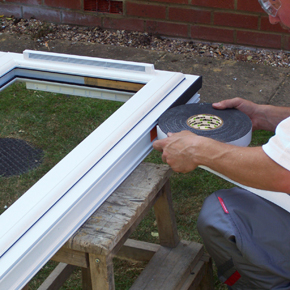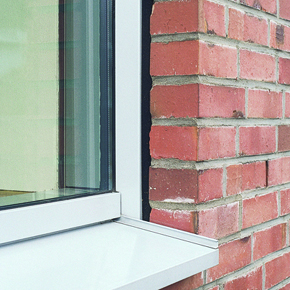
Wet or dry – what’s the solution to perimeter sealing?
Impregnated tapes are well specified and understood in the commercial window market and the many benefits, including thermal insulation of the joint, are becoming accepted in the domestic replacement sector.
Here, Steve Wild, business development manager for windows and façades at tremco illbruck, makes the case for a dry solution to perimeter sealing…
In the domestic replacement window market, the preferred choice of sealant for the perimeter sealing of windows has long since been established as silicone and, provided the appropriate type and quality is used, this can provide a durable seal which meets most expectations when correctly applied.
 What happens though, if a poor quality or wrong grade is chosen and perhaps coupled with an inferior application and an unsightly bead which draws attention to the edge of the window for the wrong reasons?
What happens though, if a poor quality or wrong grade is chosen and perhaps coupled with an inferior application and an unsightly bead which draws attention to the edge of the window for the wrong reasons?
Achieving a neat bead is often difficult, especially when the joint width varies and the construction reveal is irregular. Then there are the vagaries of the weather – sealants should not be applied to damp substrates or ones that may have experienced rainfall prior to curing.
Perhaps then, it is somewhat surprising that silicones (and occasionally other wet sealants) have proved to be so popular for such a long time given the above issues.
It is a fact that a very valid alternative has been available for around 20 years and one which has proven very popular in the commercial market – particularly when considering high performance windows, typically wood/ aluminium composites.
In this sector, those associated with the specification and use of associated materials have considered the high performance, durability and BBA certification provided by some impregnated tapes eminently suitable for providing a weather tight seal.
While, in the domestic market, it is a somewhat sad fact that very often, literally the only criteria considered when selecting the sealing product is price. It is well known that buyers and/or business owners will make such decisions based on saving a few pence on a cartridge. This policy is even more ill-founded when the windows themselves are increasing in quality and, therefore, deserve to be sealed more appropriately.
The domestic window market is always receptive to new ideas, despite what is often a deep-seated reluctance to change and an obsession with price.
Any analysis of the window energy-rating scheme will demonstrate that, if the concept is right, companies will invest in development and marketing in an effort to gain a competitive edge. There is every reason, therefore, to consider the benefits of alternative methods of sealing the windows in order to enhance the excellent properties of the window.
Impregnated tapes are well specified and understood in the commercial window market and the many benefits, including thermal insulation of the joint, are becoming accepted in the domestic replacement segment.
Any product’s market share will grow with increasing awareness and, as more suppliers promote such materials – and word of mouth endorsements follow – more installers are reacting positively. Social media is helping with this and B2B recommendations are increasing awareness.
Before the end of the year, the revised BS 8213-4 Code of practice for survey and installation of windows and external doorsets will be launched and recommendations for sealing windows and doors will include impregnated foam tapes in addition to conventional wet sealants.
This will inform installers of alternative methods of perimeter sealing and should provide comfort for building or fenestration inspectors that such products are recognised as being appropriate.
A typical installer has the choice to carry on regardless or consider a more innovative approach and promote the benefits of an alternative solution which, over a long period of time, has been proven to work and offer genuine enhancement to both installation practice and aesthetics.
Latest news

17th April 2025
Nuaire shares expertise at Specifi Mechanical Services events in 2025
Indoor air quality and ventilation manufacturing specialist Nuaire is pleased to be exhibiting at the Specifi Mechanical Services events once again in 2025.
Posted in Air Conditioning, Articles, Building Industry Events, Building Industry News, Building Products & Structures, Building Services, Exhibitions and Conferences, Facility Management & Building Services, Heating, Ventilation and Air Conditioning - HVAC, Restoration & Refurbishment, Retrofit & Renovation
15th April 2025
West Fraser: CaberDek earns top marks from Home Counties carpentry specialist
A specialist carpentry sub-contractor covering housing sites across a large swathe of the Home Counties has come to value CaberDek from the West Fraser range for a variety of reasons: not least because the high quality panel product doesn’t destroy his operatives’ electric saws!
Posted in Articles, Building Industry News, Building Products & Structures, Building Systems, Case Studies, Restoration & Refurbishment, Retrofit & Renovation, Roofs, Timber Buildings and Timber Products, Wooden products
15th April 2025
GEZE: The Role of Access Control Systems in Enhancing Building Safety
Jane Elvins, Specification and Business Development Manager at GEZE UK, delves into the role of access control systems in enhancing building safety…
Posted in Access Control & Door Entry Systems, Architectural Ironmongery, Articles, Building Industry News, Building Products & Structures, Building Services, Doors, Facility Management & Building Services, Health & Safety, Restoration & Refurbishment, Retrofit & Renovation, Security and Fire Protection
11th April 2025
Don’t Do a Dave! It’s Time to Lock FIT Show 2025 in Your Calendar!
It’s that time again – FIT Show is back! You could be forgiven for thinking there won’t be much new to see when FIT Show returns to the NEC from 29 April – 1 May. Wrong!
Posted in Articles, Building Industry Events, Building Industry News, Building Products & Structures, Building Services, Continuing Professional Development (CPD's), Exhibitions and Conferences, Information Technology, Innovations & New Products, Restoration & Refurbishment, Retrofit & Renovation, Seminars, Training
 Sign up:
Sign up: